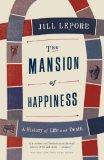Summary | Excerpt | Reviews | Beyond the Book | Readalikes | Genres & Themes | Author Bio

Critics' Opinion:
Readers' Opinion:
First Published:
Jun 2012, 320 pages
Paperback:
Mar 2013, 320 pages
 Book Reviewed by:
Book Reviewed by:
Elizabeth Whitmore Funk
Buy This Book
What is the meaning of life? In Twists and Turns, whoever ends up with the most "Life Points" wins, although, technically, the object of the game is to "experience all that LIFE has to offer!" With Milton Bradley's Visa card in hand, you can do whatever the hell you want. "A THOUSAND WAYS TO LIVE YOUR LIFE!" the game box screams. "YOU CHOOSE!" No one dies; no one grows old; no one even grows up. You can play for five minutes or five hours. Or you can just quit, which, all things considered, I recommend.
"Men have an indistinct notion that if they keep up this activity of joint stocks and spades long enough all will at length ride somewhere," Thoreau wrote. But where? Twists and Turns failed, not because it was aimless, but because it wasn't aimless enough. By the time it came out, kids were busy leading virtual lives online, some of them in a place called Second Life, a simulated world where you could live your life all over again, or instead, forever.
If the history of games of life tells a story, it's a story about a voyage to nowhere. God, machines, markets, science: each new faith, even faith in uncertainty, is its own creed. Each has its philosophers, each its huck- sters, and between them lies a history of beliefs about the beginning, meaning, and end of life. Twists and Turns is the aimless, endless game of secular, liberal modernity. How does life begin? What does it mean? What happens when you're dead? Who knows. YOU CHOOSE!
History can't answer existential questions about life and death; it can only investigate and use evidence to tell stories that make arguments about the relationship between the living and the dead, like the story of Milton Bradley. After the Checkered Game of Life, Bradley lost interest in games.53 In an age when success made the man - when to fail was to be a failure - he spurned his own achievement.54 He reached Fat Office, and then he walked out. Beginning in the 1870s, he devoted his energies not to board games but to the nascent kindergarten movement, a plan to offer free education to four-, five-, and six-year-olds, and especially to the children of the poor.
Increased wealth brought increased want, as Henry George pointed out in Progress and Poverty, in 1879: "Discovery upon discovery, and invention after invention, have neither lessened the toil of those who most need respite, nor brought plenty to the poor." What could be done? The restless, nervous, steam-powered nineteenth century had this how-the-other-half-lives underside: social welfare efforts aimed to rescue the people who were being ridden over by the engine of progress. Enthralled by the idea that very young children could learn through art, a kind of learning that would set them up not only for future academic success but for happiness, too, Bradley started manufacturing crayons, colored paper, color wheels, flash cards, and watercolors, for classrooms. He invented the one-armed paper cutter. He set up a printing shop in Springfield in order to publish, in 1887, The Paradise of Childhood, a lavishly illustrated manual for kindergarten teachers, adapted from the writing of the movement's German founder, Friedrich Froebel. Soon he was printing a monthly journal, the Kindergarten Review.
Then he entered his decrepitude and, next, his dotage. He began falling asleep at his desk. He started taking naps in his office; he ordered the presses in his factory stopped for half an hour after lunch every day, so as not to disturb his rest. He retired in 1907; he was seventy-one. In 1910, his colleagues toasted him and gave him the gift of a book of tribute essays titled Milton Bradley: A Successful Man. But, writing in the Kindergarten Review, Bradley reflected that, of all he had done, he was most proud of his educational inventions, which had earned him barely any money at all. "In using the word success, I do not wish to confine its meaning to that cheap interpretation which sees only the glitter of gold or the glamour of elusive fame. In my case, I cannot overestimate the feeling of satisfaction which has been with me all these years at the thought that I have done some- thing, if only something prosaic in character, to place the kindergarten on its present solid foundation." It was a lesson any clever child might have drawn from playing the Checkered Game of Life: Beware of Ambition. It sounds good, but if you land there, you are promptly sent to Fame, a square that not only has no value, in itself, but also puts you perilously close to Jail, Prison, and Suicide. Success isn't everything.
Excerpted from The Mansion of Happiness by Jill Lepore. Copyright © 2012 by Jill Lepore. Excerpted by permission of Knopf, a division of Random House, Inc. All rights reserved. No part of this excerpt may be reproduced or reprinted without permission in writing from the publisher.





The House on Biscayne Bay
by Chanel Cleeton
As death stalks a gothic mansion in Miami, the lives of two women intertwine as the past and present collide.

The Flower Sisters
by Michelle Collins Anderson
From the new Fannie Flagg of the Ozarks, a richly-woven story of family, forgiveness, and reinvention.

The Funeral Cryer by Wenyan Lu
Debut novelist Wenyan Lu brings us this witty yet profound story about one woman's midlife reawakening in contemporary rural China.
Your guide toexceptional books
BookBrowse seeks out and recommends the best in contemporary fiction and nonfiction—books that not only engage and entertain but also deepen our understanding of ourselves and the world around us.